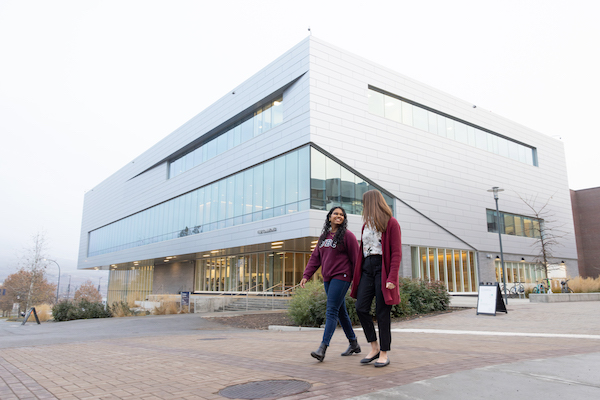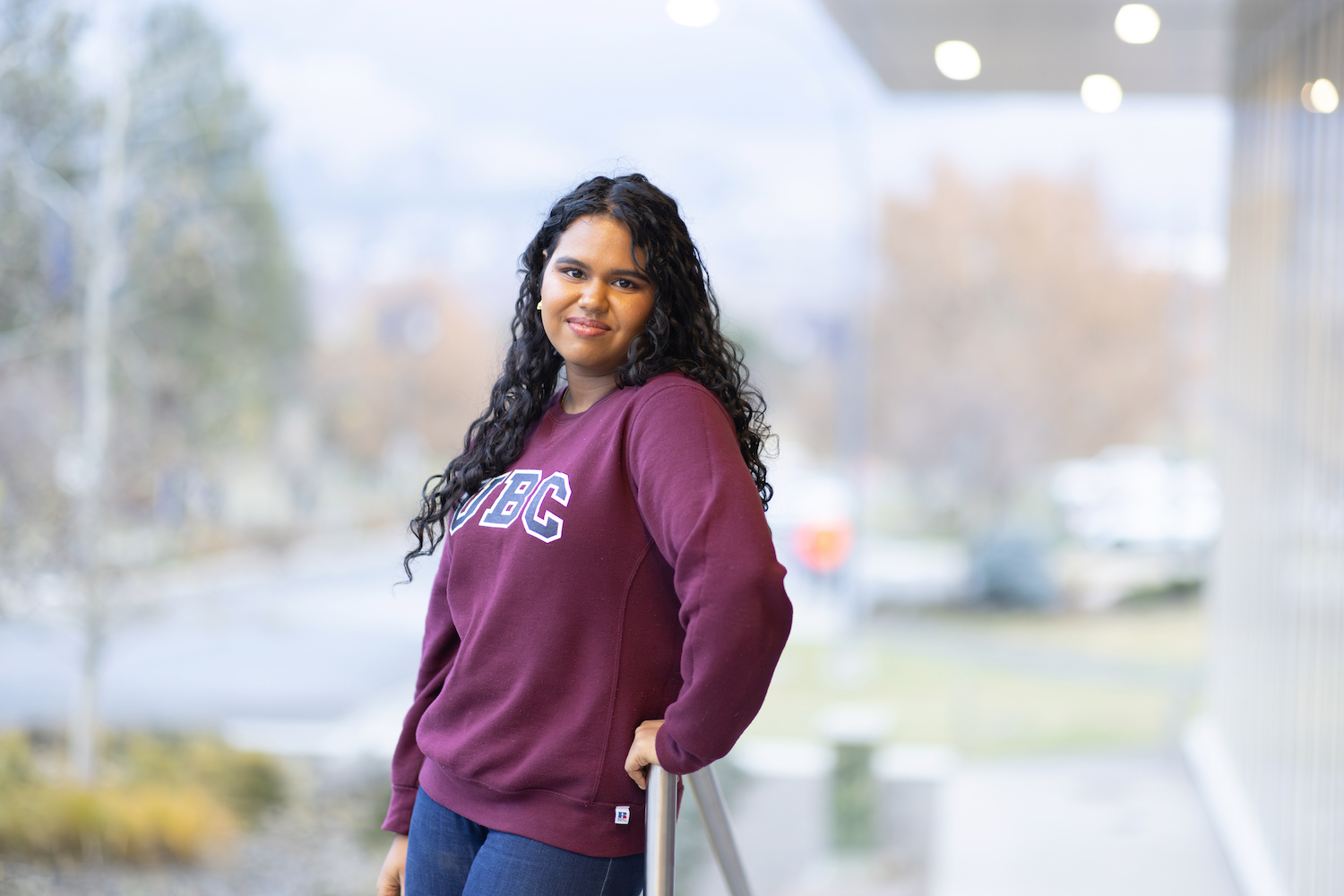When Dresya started at UBC she was originally considering a Bachelor of Science degree but, instead, fell in love with Nursing and how it blends science with person-centred care.
Throughout her time at UBC, Dresya chose to do a research preceptorship in nursing, working as an undergraduate research assistant and a lab monitor. She has done research on self-care strategies among patients with atrial fibrillation as well as research related to detecting tumours in mammograms. When she graduates, she wants to pursue a position as a cardiac nurse and researcher.
Read more about how she fell in love with research and the moment that validated her decision to become a nurse.

1. What made you decide to enrol in Nursing at UBC Okanagan? What was your decision process like?
What led me to pursue nursing was the desire to understand the world around me. Initially, I believed that a Bachelor of Science degree, with its rigorous sciences, was the only way to comprehend the complexities of our experiences. Yet, conversations with clients in residential homes (where I volunteered) and with my mother, who has been a nurse for 20 years, led me to consider nursing. The nursing profession offered a desirable compromise between science and art. It simultaneously allows me to embrace the precision of scientific knowledge and the profound artistry of providing person-centred care. With this in mind, the Nursing program at UBC Okanagan was an easy choice. The program creates a seamless bridge between evidence-based practice and person-centred care in all the courses it offers.
2. What has been your experience in the program so far?
The program pushes me to redefine what it means to be a “nurse” daily. There has not been a day where I have not learned something new. Whether it is delving into the pathophysiology of a disease or acquiring a new clinical skill, the learning never stops. In my experience, the program at UBC Okanagan also understands the profound importance of people in nursing. It pushed me to look beyond mastering the scientific basis of nursing, and incorporate the patient’s lived experiences into the care I provide. After all, it is one of the few programs that permit students to start clinical practice in their first year. The program also highlights the importance of collaboration and teamwork as well. With every group project, I have come to appreciate that nursing is not a solitary endeavour, but rather a collective effort.
3. Can you talk about the research project that you’re currently working on?
Certainly! The latest research I worked on aimed to modify a clustering algorithm–fuzzy c-means–to detect tumours in mammograms. I was introduced to the concept of using machine learning in medical imaging by the MURPH (Multidisciplinary Undergraduate Research Projects in Health) program at UBC Okanagan. From there, we focused on adapting the clustering algorithm, acquiring a comprehensive mammogram dataset, and testing the algorithm to industry standards. Our ultimate goal was to tackle the critical issue of late detection of breast cancer to improve patient outcomes. What motivated me throughout the project was witnessing the profound frustration that patients and their families experience due to late diagnoses. Late diagnoses often limit treatment options and reduce the likelihood of a favourable prognosis for patients. The research process was truly invigorating and served as a powerful reminder of the role of interdisciplinary collaboration in healthcare.
4. Do you have any special memories at UBC that stand out? Is there a moment that validated your decision to come to UBC and pursue Nursing?
One of the moments that comes to mind is when I cared for a patient recovering from a stroke in my first year of clinical. I was tasked to get the patient up to walk. It was a rather mundane task to carry out; it was not a life-saving intervention like the ones you see in a TV show. Yet, the wide grin the patient gave me when I stated I would help them walk was unmatched. The stroke had profoundly altered their ability to walk, and these would be some of the first steps the patient took independently. It was evident that every step we took together represented a monumental milestone in their recovery–and I could not help but share the excitement. It was this moment that affirmed my decision to pursue Nursing at UBC. It was there and then that I recognized how nurses not only witness patients in their moments of vulnerability; they also play a part in their journey to recovery.
5. What are your favourite spots on campus? Best study spots, places to eat, best coffee?
When I am not wandering about on campus, you will find me either in the library or the Lois and Cliff Serwa Reading Room in The Commons. The library is my go-to spot for group projects with its vibrant, but productive atmosphere. The Lois and Cliff Serwa Reading Room, on the other hand, offers a quiet place to finish out those assignments you accidentally left until the last minute. In my opinion, there is not much that can’t be fixed with a double-double from Tim Hortons. However, all coffee is good coffee for us nursing students, so tread with caution.
6. What opportunities have you taken advantage of to connect with the campus and other students (clubs, volunteering, etc.)? How have they affected your experience here?
Over the four years, I was fortunate enough to have multiple opportunities to connect and engage with students and mentors. Professionally, I have worked as an undergraduate research assistant and a lab monitor within the School of Nursing. Under the guidance of some talented professors, I conducted research on self-care strategies among patients with atrial fibrillation. This pushed me to apply for the MURPH program at UBC Okanagan, where I was connected with student researchers outside the nursing profession. The program allowed me to explore new methodologies, techniques, and areas of knowledge. I learned to collaborate and work cohesively with team members whose knowledge base differed greatly from mine. These experiences made me fall in love with research, leading me to pursue a research preceptorship in nursing. The preceptorship grants me an opportunity to gain hands-on research skills and knowledge under the guidance of accomplished researchers within the field of health and medicine.
Volunteering with the Emergency First Response Team (EFRT) has been an invaluable experience, allowing me to enhance my first-aid skills while fostering lasting friendships with students from different faculties. Additionally, my involvement with the Sexual Violence Prevention and Response Office (SVPRO) has inspired me to make meaningful changes by creating a campus environment that is safe for all. These experiences pushed me to develop skills of inquiry, critical thinking, communication, and advocacy — which later led me to pursue a presidential role in the Nursing Course Union. Now, as the president of the NCU, I get to support and advocate for student nurses across the four years of the program.
Each of these experiences exposed me to diverse groups of people, whose perspectives made me appreciate the complexities and richness of the human experience.
7. How will your studies in Nursing at UBC Okanagan help you achieve your career goals?
In the future, I wish to pursue a position as a cardiac nurse and researcher. The School of Nursing has been pivotal in connecting me with the resources I need to achieve this goal, including the opportunity to precept under the mentorship of researchers who are true pioneers in their respective fields.
In the end, I can’t emphasize enough how it is the people that have helped me thrive. From classmates to dedicated faculty members, the entire School of Nursing community has played a pivotal role in shaping my path to becoming a nurse.
8. Do you have any tips for someone who’s considering Nursing at UBC Okanagan?
Tuum Est; Your experience at UBC is what you make of it. Be open to new experiences, both in and outside the classroom. Reach out to professors and fellow students, and be amazed at what you can learn from them. Who knows? You might find yourself considering positions that you never thought were possible. Be okay with not knowing everything, because there will be times when you simply do not know the answer. Take these moments as an opportunity to learn. Last but not least, take courses outside of your degree, and expose yourself to diverse viewpoints and ways of thinking. After all, your time at UBC is a chance to define your unique path, and the possibilities are endless–make it extraordinary, and make it yours.
